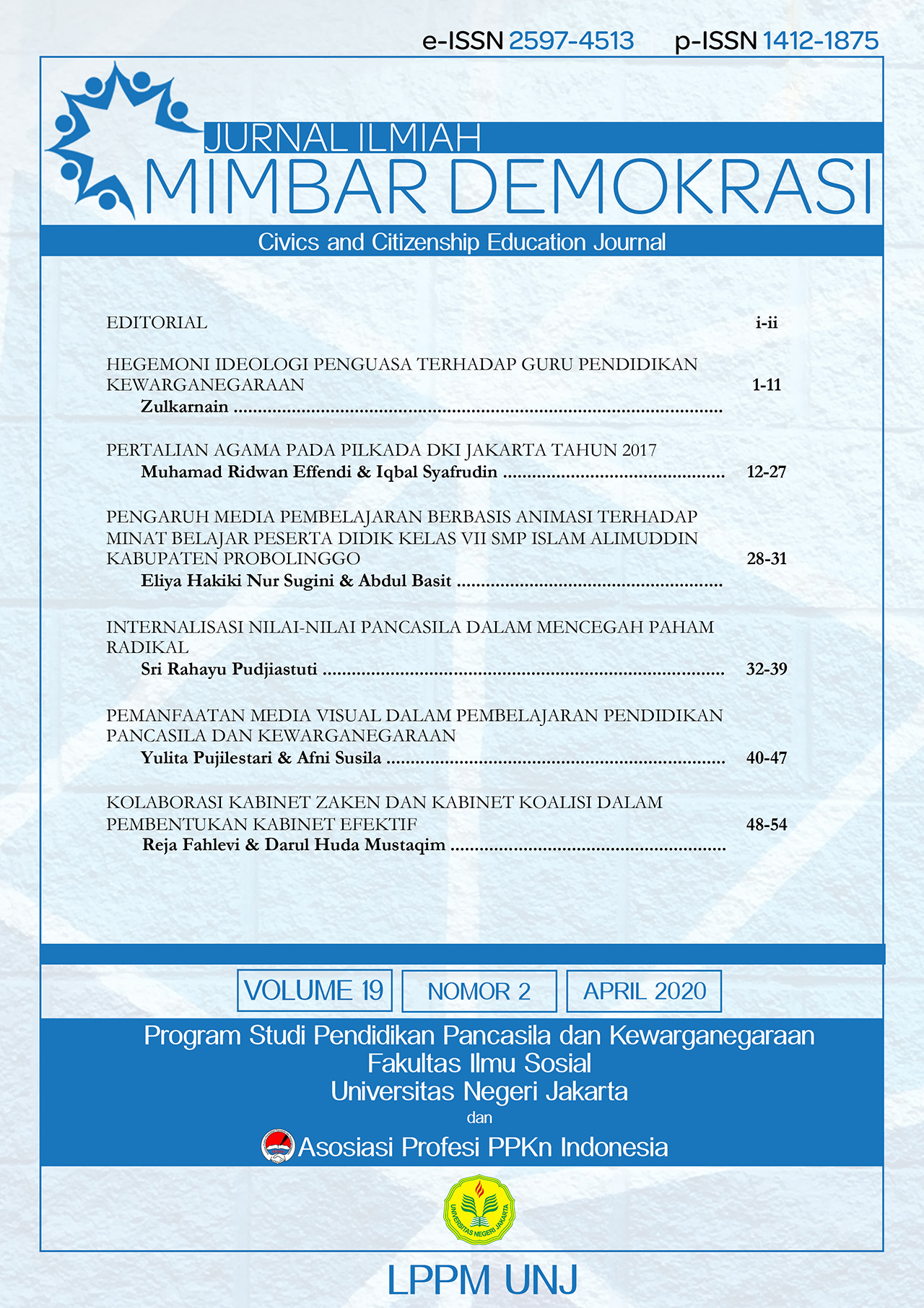Hegemoni Ideologi Penguasa Terhadap Guru Pendidikan Kewarganegaraan
DOI:
https://doi.org/10.21009/jimd.v19i02.4975Keywords:
Citizenship education, Teacher, PAP, Singapore HegemonyAbstract
This paper wishes to conduct a critical analysis of Citizenship Education in Singapore. Citizenship education as one of the national agenda in Singapore has an important position in providing citizenship understanding in order to prepare young citizens for the future of Singapore. Singapore's centralized education system and strict controls lead to highly vulnerable citizenship education politicization and ideologization of citizens through education. In fact, many studies show that the government under the People's Action party (PAP) is using authoritarian ways to defend and perpetuate its power through education. The attempts by the Singapore government with the soft authoritarian government or some experts say authoritarian with the usual Gramscian meaning "hegemony". Hegemony is the effort of a person or group of people (state) in maintaining or dominating his power in a peaceful way not by violence. With literature research and critical analytical descriptive methods in the form of relevant books and research, this paper wants to show how the PAP seeks to interpret its ideology with the hegemony done to teachers of citizenship education. The study concludes that not all teachers are hegemonized by Singapore's strict citizenship education policy.
References
Apple, M. W. (2004). Curriculum and ideology. New York: Routledge.
Gopnathan, S. & Bakar, 2013. Globalization, Curriculum Reform, Vision and Discourses, sebuah bab dalam buku globalization and the Singapore curriculum from policy and classroom. Singapore: Springer.
Ardilla, A.F. (2014). Demokrasi semu di Singapura pada Masa Pemerintahan Lee Kuan Yew. Dalam jurnal hubungan internasional Vol 1, No 2.
Baildon, M. C. & Sim, J.B.Y. (2009). Notions of criticality: Singaporean teachers’ perspectives of critical thinking in sosial studies. Dalam jurnal Cambridge Journal of Education Vol. 39, No. 4, pp, 407–422.
Chia, Y.T. (2016). Singapore General Election 2015 and the Role of Citizenship Education. Dalam jurnal The Round Table, Vol. 105, No. 2, pp 149–160.
Djamarah, S.B. (2010). Guru dan Anak Didik dalam Interaksi Edukatif. Jakarta: Rineka cipta
Gopinathan, S & Sharpe, L.(2004). New Bearings for Citizenship Education in Singapore.Bab dalam buku citizenship Education in Asia and Pasific concepts and issues. Hongkong: Springer and Bussines Media.
Hefner, R, W. (2007). Politik Multikultural. Yogyakarta: Kanisius
Imam, M.A.H. (2016). Sistem pemerintahan soft-autoritharian Singapura di tengah arus demokrasi. Dalam Jurnal Pemerintahan dan Politik Volume 1 no.2, hal 1-5.
Kalidjernih,F.K. (2010). Kamus Studi Kewarganegaraan:Perspektif Sosiologikal Dan Political. Bandung:Widya Aksara Press.
Ministry of education Singapore, (2016). Character and Citizenship Educatin Pre-university. Singapore: Student develovment Curriculum Devision Ministry Of education Singapore.
Mohamed, K.N. & Turner, B.S.(2013) Governing as gardening: reflections on soft authoritarianism in Singapore. Dalam jurnal citizenship studies, volume 17, no,3-4. Pp.339-352.
Nozaki, Y., Openshaw, R., & Luke, A. (2005). Struggles over difference: Curriculum, texts, and pedagogy in the Asia-Pacific. New York: SUNY Press.
Palmer, J.A. (2015). Ide-Ide Brilian 50 Pakar Pendidikan Kotemporer: Paling Berpengaruh di dunia Pendidikan Modern. Yogyakarta: IRCiSoD.
Pramono, M. (2014). Melacak Basis Epistemologi Antonio Gramsci. Dalam buku Epistemologi Kiri. Yogyakarta: Ar-Ruzzmedia
Rupert, M. (2010). Antonio Gramsci. Dalam Edniks, J & Vaughan, N.W. Teori-teori Kritis Menentang Pandangan Politik Internasional. Yogyakarta: Baca.
Samsuri, (2011). Pendidikan Karakter. Yogyakarta: Diantara Pustaka Indonesia
Sim, J. B.Y (2011). Simple ideological “Dupes” of Nation Governments? Teacher Agency and Citizenship Education in Singapore. Sebuah bab dalam buku Citizenship Pedagogies in Asia and Pacific. London New York: Springer.
Sim, J.B.Y & Print, M. (2005). Citizenship Education and Sosial Studies in Singapore: A National Agenda. Dalam jurnal International Journal of Citizenship and Teacher Education Vol 1, No. 1, pp 58-73.
Sim, J.B.Y & Print, M. (2009). Citizenship education in Singapore: controlling or empowering teacher understanding and practice? Dalam jurnal Oxford Review of Education Volume 35, no.6, Pp705-723.
Sim, J.B.Y. (2011). Sosial studies and citizenship for participation in Singapore: how one state seeks to influence its citizens. Dalam jurnal Oxford Review of Education Vol. 37, No. 6, pp. 743–76.
Sim. J.B.Y & Print. M. (2009). Citizenship Education In Singapore: Kontrolling Or Empowering Teacher Understanding And Practice. Dalam jurnal British Journal of Educational Studies, ISSN Vol. 57, No. 4, pp 380–399.
Sim. J.B.Y & Print. M. (2009). The State, Teachers and Citizenship Education In Singapore Schools. Dalam jurnal Oxford Review of Education Vol. 35, No. 6, pp. 705–723.
Suparlan, (2008). Menjadi Guru Efektif. Yogyakarta: Hikayat Publishing.
Tan, K.P (2012). The ideology of pragmatism: neoliberalisation and political authoritarianism in Singapoe. Dalam Journal of Contemporary Asia Vol. 42, No. 1, pp. 67–92.
Thornton, S.J. (2005) Teaching sosial studies that matter: Curriculum for active teaching. New York: Teachers’ College Press.
Tilaar, H. A.R. (2003). Kekuasaan dan Pendidikan. Magelang: Indonesia Tera
Tilaar, H. A.R. (2016). Kebijakan Pendidikan.Yogyakarta: Pustaka Pelajar








